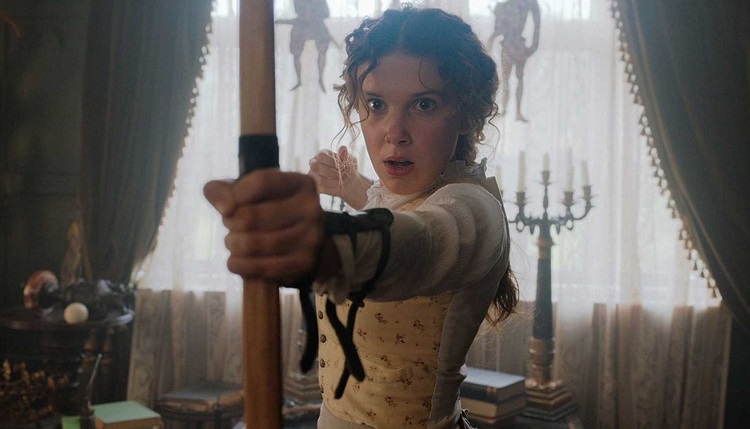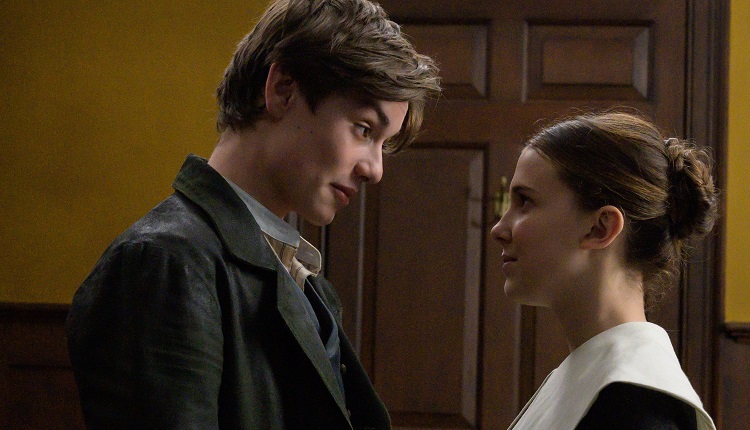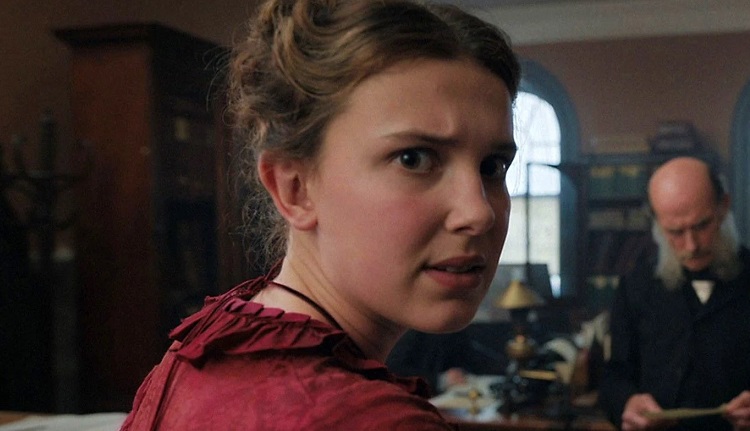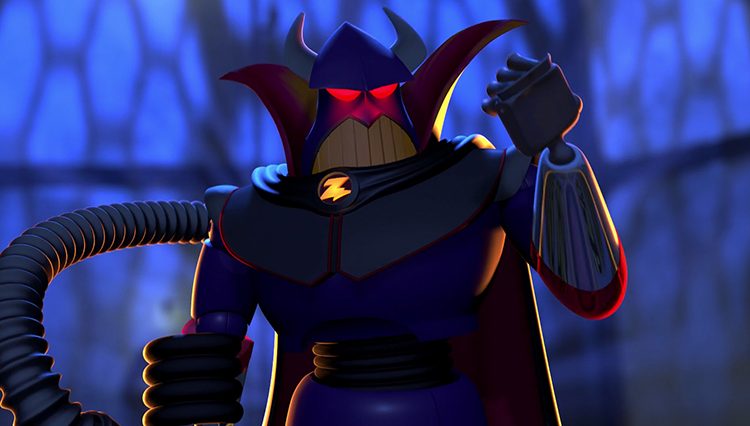
“Sometimes you must dangle your feet in the water in order to attract the sharks.”
Enola Holmes, 2020 (Millie Bobby Brown) Legendary Pictures/Netflix
Enola Holmes (Millie Bobby Brown) is completely wrapped up in herself. She’s the delicious toy surprise that only she is privy to, barring the viewer, whom she addresses every so often when she feels we haven’t quite grasped her scene-specific quagmire. She’s clever and quick. She dresses smartly, either as a boy or a girl, which she does often if only to confuse those hopeless, ill-educated denizens of her late 19th century world. No girl would ever willingly dress like a boy! Pish-posh!
This world is ruled by humorless men and old women all determined to make sure Enola goes to a Handmaid’s Tale-style finishing school, stop trying to rescue a wayward Tuck Everlasting-looking viscount named Tewkesbury (Louis Partridge), and generally behave like a proper young lady. Because this is 2020, none of these characters conduct themselves (to the movie’s detriment) in a historically realistic way. Instead, Enola addresses us in Ferris Bueller fashion, telling us what she is going to do before she does it while referencing how she is able to do what she does … before she does it. This robs us of any kind of suspense.

Enola Holmes isn’t supposed to be a cutesy comedy, and given the show’s lineage, a series of young adult books by Nancy Springer (in turn based on the Sherlock Holmes books by Arthur Conan Doyle), it’s disconcerting to have no real mystery to solve. If there is a mystery, it would be the disappearance of Enola’s mother, Eudoria (Helena Bonham Carter). Enola believes Eudoria is sending her coded messages through newspaper classified ads, which begs a question. If she doesn’t want to be found, why is she sending her daughter clues as to her whereabouts? If she wants to be found, why did she disappear?
I don’t think we ever get a proper answer (which makes me wonder if this is not possibly a television pilot for a proposed series), but because the real story of the piece is the runaway viscount, it ultimately doesn’t matter, except to see Eudoria in flashbacks teaching Enola various hand-to-hand combat techniques (the movie is rife with frustrating anachronism) so that we can see her perform these feats in the present day. Enola has no depth. She is “merely” perfect in everything she does until she is beset by the true villain of the piece: her eldest brother, Mycroft, who stubbornly insists she start behaving like a vacuous princess.
Mycroft and Sherlock are thick pieces of cardboard in the movie; obstacles to be overcome. Admittedly, Sherlock (Henry Cavill) comes off a little nicer, but that was only because the writers and producers (Millie Bobby Brown among them) were prevailed upon not to besmirch the character’s legacy. They contribute nothing to the story besides their famous fictional canon, even if the Enola character herself may be a product of ret-conning. I had never come across any reference to a younger Holmes sister in the stories I had read. I could be mistaken, but that doesn’t matter.

The movie’s problem is a lack of conflict and the absence of mystery. Enola Holmes would’ve been so much better if it had stayed within the lines of the time period it sought to recreate, and if there were stakes. A girl being forced to go to finishing school so she can marry a rich suitor and live her adult years in overstuffed comfort is hardly life-threatening. Back to the time period. If Enola were forced to negotiate on the basis of her gender and the constrictions of the time period, we might’ve seen some unusual and interesting conflicts, but we don’t get that.
This movie could have been made for 2020. The only missing items would be those wonderful costumes and carriages. Brown is an extremely talented young actress. She had successfully (and astonishingly) anchored three seasons of Stranger Things. Here, she is out of her element, determined to construct a cultural icon rather than tell a story with her unusually expressive face. I was hoping for more.



